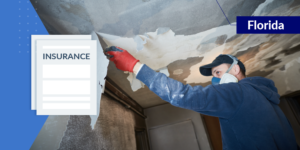
An Ohio-based rating agency’s plan to downgrade 17 Florida property insurance companies is just the latest blow to the state’s teetering property insurance market.
Rating agency Demotech plans to downgrade the ratings for the yet-unnamed 17 property insurance companies in the near future. Demotech originally planned to release the updated ratings this week, but has since delayed its announcement due to a significant pushback from state leaders.
“This thing could get really ugly really quick,” said Florida State Senator Jeff Brandes.
State officials warned that once the insurance companies’ ratings were downgraded, millions of Florida homeowners could be in default of their mortgage requirements. Certain mortgage companies such as Fannie Mae and Freddie Mac require an “A” rating from a homeowner’s insurance company.
If a property owner’s insurer were to lose that “A” rating, the homeowner will evidently have several months to find new coverage that meets their mortgage requirements. But in the state’s current insurance crisis, this might not be an easy task.
Florida state legislators have already had to step in to address significant issues in the property insurance market. As the state descends further into hurricane season, this latest shakeup represents yet another major challenge to insurers, homeowners, and by extension, restoration contractors.
The Sunshine State’s property insurance market has had a rough few years. Hurricanes, roofing scams, costly litigation, and poor management have resulted in declining revenues for the state’s property insurance industry — overall, the state’s insurers have posted losses exceeding $1 billion in each of the last two years.
Property insurers have been filing bankruptcy left and right, canceled policies have become common, and some insurers have abandoned the state entirely. The situation grew so dire that Florida Governor Ron DeSantis recently called for a special legislative session to address the industry’s concerns and protect tens of thousands homeowners at risk of losing coverage.
While the legislation enacted a number of changes that could bring stability to the struggling insurance market, it’s clear Florida homeowners are not out of the woods yet.
A growing number of Florida property insurance companies have either filed bankruptcy, become more selective about issuing policies, or left the state entirely. As a result, hundreds of thousands of Florida residents have turned to the state’s insurer-of-last-resort, Citizens Property Insurance, to find coverage.
This is hardly a good time for 17 insurance companies to lose their “A” ratings that are required for mortgages of a huge number of Floridians. Once this happens, affected homeowners will likely need to source new property insurance within a certain time window. If they can’t, their mortgage company could force them to accept a very basic policy with a new insurer.
“With force-placed insurance, the only party protected is the mortgage company,” said one insurance broker. “So you’re paying an outrageous premium and basically getting no coverage.”
Insurance turbulence a major obstacle for repair and restoration
As the Sunshine State moves deeper into hurricane season, a sudden insurance shakeup could become a major obstacle for repair and restoration claims. While homeowners are the most immediately at-risk group here, these ratings changes could pose problems for contractors dealing in restoration work as well.
Contractors who specialize in restoration and repair work face unique payment challenges. Generally, these types of contractors will only be paid once an insurance claim is paid out.
It can be considerably harder for a contractor to get paid if there are insurance complications — recent insurer bankruptcies, rising premiums, and canceled policies can certainly throw a wrench in the works, especially if a contractor is mid-project.
But if potentially millions of Florida property owners are suddenly forced to find new coverage (in an already stressed market), it’s possible this may have an effect on the amount of restoration and repair claims filed.
Homeowners might think twice about filing an insurance claim if their new policy is more expensive or doesn’t provide the same level of coverage. This could result in restoration contractors seeing less work than usual.
Fortunately, Demotech’s delay suggests the ratings agency is aware of the chaos that could ensue if it releases its updated ratings.
“As the current regulatory climate has become hostile and negative and we have and will expend a significant effort creating responses to third party letters, we will be taking additional time to review information and consider the issues affecting the companies operating in Florida,” said Demotech in a statement to the media regarding its decision.
Ratings change delay gives state leaders time to react
While the ratings changes are likely to still happen, the delay gives state officials more time to address the continuing insurance crisis in Florida. Some are hopeful that given the size of this issue, pressure is growing for state leaders to find a solution.
“Because we have a such a large, big problem statewide, probably it’s an issue the state is going to have to get involved more actively,” said Florida attorney Charles Gallagher III. “And probably going to have them requesting from lenders and carriers some cooperation and some flexibility.”
The state legislature’s special session made some progress towards creating a more stable insurance market by introducing a $2 billion reinsurance plan, but it’s clear there is still plenty of work to be done.
On Wednesday, Governor DeSantis and other state leaders announced additional reinsurance efforts and suggested the state’s Citizens Property Insurance could be used to protect the 17 at-risk insurers.
While finding a solution for Florida’s insurance crisis is clearly a priority for state leaders, it’s important for contractors to do what they can to protect cash flows and secure the right to payment, especially in a turbulent market.
For restoration contractors in Florida, a mechanics lien provides protection in the event a homeowner’s insurance policy is canceled. A mechanics lien places a claim on the property itself, and will put further pressure on the owner to find a new policy that will cover a contractor’s services.